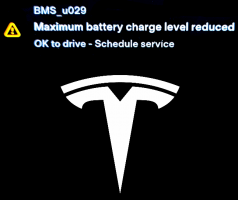
— A Tesla Model S and Model X lawsuit alleges software updates drain the batteries and cause BMS error codes, specifically “BMS_u029” which the class action alleges indicates the battery is depleted or inoperable.
According to the class action lawsuit, Tesla Model S and Model X owners are forced to pay third-party shops anywhere from $500 to $750 to reverse the software updates so owners can drive their vehicles.
The owners who sued assert the software updates can cause complete failures of the batteries, leading to battery replacements that can cost an owner up to $15,000.
Owners claim the software updates drastically reduce the battery range, yet Tesla allegedly denies the problem is caused by software updates.
Tesla BMS error codes allegedly occur because vehicle owners are forced to receive software updates for the Model X and Model S. According to the plaintiffs, a driver who sees the BMS_u029 error code knows trouble has arrived.
Tesla BMS Error Code Lawsuit — The Plaintiffs
California plaintiff David Bui-Ford purchased a used 2013 Tesla Model S P85+ in February 2022, and in September 2022 he received notice from Tesla that his Model S vehicle was going to receive a software update.
But he says Tesla did not tell him what the update was for or any possible effects on the battery.
The plaintiff says he received the BMS_u029 error code message that same month, and the plaintiff alleges his battery range was reduced from 270 miles per charge to 80 miles per charge.
He took the Model S to an auto shop in October 2022 and the shop "was able to undo the software update and fix the BMS_u029 battery error through what the auto shop described as a 'software reset.'”
The plaintiff says he had to pay $500 for the repair to get the vehicle's battery range back to 270 miles when fully charged.
Illinois plaintiff Igor Kravchenko purchased a new Tesla Model S in December 2021. Plaintiff Kravchenko claims he did not receive a sales agreement which includes a binding arbitration clause.
The class action lawsuit alleges the plaintiff has noticed the battery capacity has drained following a series of software updates.
"In particular, a year ago Plaintiff Kravchenko would notice an average daily battery drain of between 4-5% during very cold days, and a drain of 1-2% on other days. But now, following software updates, he experiences a 8% battery drain even during moderate temperatures. Tesla never asked for his consent to perform these specific software updates, and never told him about the effects of software updates on battery performance." — Tesla BMS error codes lawsuit
Michigan plaintiff Micah Siegal purchased a used Tesla Model S in March 2022, but he says his car has experienced at least 12 software updates.
"Following these software updates, Plaintiff Siegal has noticed at least a modest drop in the stated/estimated capacity of the battery. Tesla never asked for his consent to perform these specific software updates, and never told him about the effects of software updates on battery performance. " — Tesla BMS error codes lawsuit
Washington plaintiff Lucas Butler purchased a used 2013 Tesla Model S P85+ in February 2022.
The class action lawsuit alleges the plaintiff received notice from Tesla in March 2023 regarding a software update. The plaintiff says he was never offered the option to decline the software update, an update that allegedly caused problems with his Tesla.
The next day his vehicle allegedly would not turn on. The vehicle was towed to Tesla and the plaintiff was told the battery needed to be replaced.
"The showroom quoted him $20,798.56 to replace the battery and component parts. He currently has no charge on his battery. Prior to the software update, Plaintiff Butler’s battery range was approximately 255 miles per charge; now he is unable to operate the vehicle." — Tesla BMS error codes lawsuit
According to the lawsuit, Tesla should recall the vehicles, replace them for free or issue a vehicle buyback program.
The Tesla BMS error code class action lawsuit was filed in the U.S. District Court for the Northern District of California: Bui-Ford, et al., v. Tesla, Inc.
The plaintiffs are represented by Hagens Berman Sobol Shapiro LLP, and Attorney West Seattle.




